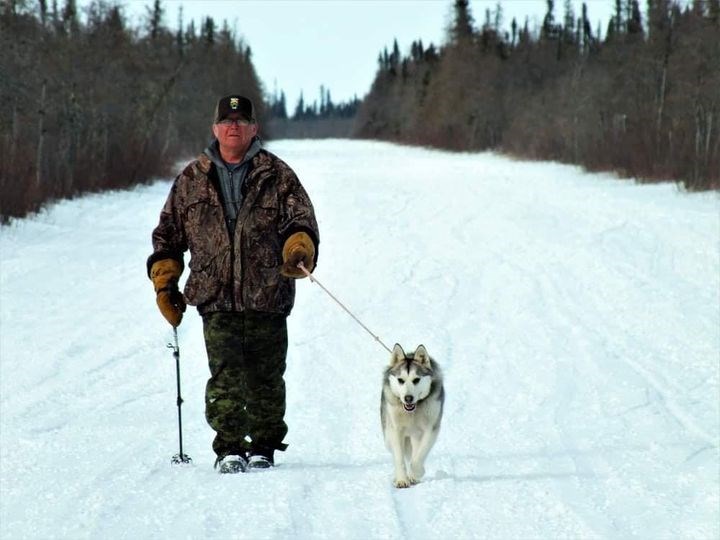The 17-day trek from Peawanuck to Moose Factory brought a “rollercoaster of emotions” to Sam Hunter.
Hunter, 55, started walking from his home community Peawanuck to Moose Factory to raise awareness about issues he feels passionate about such as diabetes, the Ring of Fire development and climate change.
He left Peawanuck on March 18 and arrived in Moose Factory last Saturday, April 3.
“It’s kind of really emotional, sad and happy at the same time,” Hunter said about finishing his journey.
Hunter is currently resting and visiting his family in Moose Factory. He plans to leave the community by plane tomorrow, April 7, making a stop in Attawapiskat and then driving to Peawanuck on a snowmobile.
The most memorable moments from his more than 600-kilometre trek were meeting people along the way. Hearing their stories and words of encouragement gave him a boost and made him really happy, Hunter said.
Hunter headed out with a sled and his dog Chase with the sole goal of helping people.
“I’m not doing this for financial gain. I just want to help people. That’s it," he said.
Originally, Hunter planned to finish his walk by the end of April.
“The winter road really helped because it was very smooth and I went twice as far on the winter road than anticipated. It’s really flat and Chase can carry a lot of stuff and walks really fast, that really helped,” Hunter explained. “I think I travelled twice the distance with Chase in the winter road.”
In the beginning, there were some challenges. Before Hunter left Peawanuck, his granddaughter went into a coma, so he returned home and had to start the walk again. Some people also doubted him, he said.
“In my mind, I knew I could do it. But at the same time, my body thought it couldn’t it,” Hunter said. “But our ancestors did it as a way of life. I think it’s only beginning to inspire others to have a better life. That’s what I wanted.”
At first, the weather was warm and it was raining, so he got soaked and a lot of snow melted. Hunter recalled he was also once scared because there was a big pack of wolves. When the weather got cold again, he fell through some ice.
“It wasn’t too bad, but I got stuck for about two hours,” he said. “After that, it wasn’t too bad.”
In Attawapiskat, Kashechewan and Fort Albany, Hunter spent the nights in a hotel or in someone’s house. On the road, between Fort Albany and Moosonee, he slept in a small tent that retained body heat to keep warm.
When he stayed in Attawapiskat, Hunter said people were very receptive and helped by giving food to him and his dog, and dropping him off where he left off.
As he was arriving in Kashechewan, there was a very cold wind and he started to cramp up. He recalled it was scary and one of his worst days.
But as he got to the community, it was really emotional because people went to meet him.
"Elders came to shake my hand and the young people,” Hunter said. “They gave me a meal and put me in a hotel, everybody was so nice. They showed me their community and what they were trying to do to help the younger generation.”
In Fort Albany, Hunter’s dog Chase, who helped pull the sled and protected him from wildlife during the night, was given the last name “The Dream.” Fort Albany’s chief and council also met Hunter and showed him the community.
Early in the morning, Hunter paid tribute to his brother who died at St. Anne’s residential school. At that moment, there was a lot of sadness and happiness for him, he said.
The last couple of days he was walking very fast, Hunter estimated he could’ve walked up to 60 kilometres a day.
“My dog Chase was the same, he could carry the whole load like nothing. As days went by, it got easier and easier,” he said.
Hunter had to ride the last 10 kilometres to Moosonee because he slipped and hit his shin. Saturday morning, he couldn’t stand on his leg and walk, so early this week he went to a hospital to do a CT scan.
During his walk, Hunter saw people going to their camps for spring hunting. He talked to many people who would stop him along the winter road, hug him, tell him they have diabetes or talk about climate change and resource development and how the quality of life should improve up the coast.
“For me, it was emotional,” Hunter said. “I cried just before I got to Moosonee just because a chopper came to meet me. People from Moose Factory were in the chopper and I wasn’t crying for myself. I cried for those who died of diabetes at an early age and people never got to see their grandchildren grow up.”
The weather elements like rain and strong winds made the walk challenging and frustrating. Hunter said it was “disheartening” at times because there was nowhere to hide from the winds and cold, and all he could do is keep walking. One day, he walked for five hours straight because if he stopped for a few minutes, he would freeze up.
“There were no trees. It’s like a snow desert, with no protection. It was so flat, you couldn’t hide from the wind,” Hunter said. “It can be scary sometimes. Some people that don’t have endurance or strength could freeze up in those situations.”
Upon his return home, he will start uploading podcasts where he will talk about the three issues as well as share stories and legends of people who live up the coast.
“It’s been a great adventure. I’m proud that I’ve done it because I’m not getting any younger,” he said.



